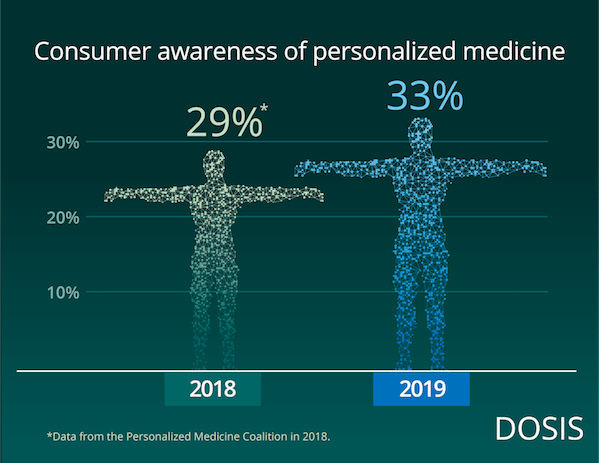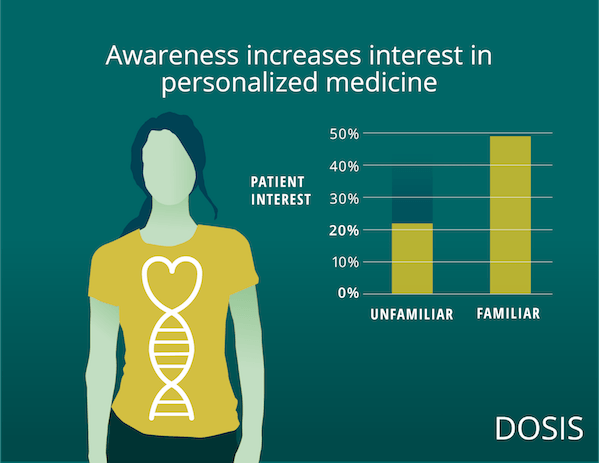
Consumer awareness of personalized medicine is up 4% from 2018, according to a new report from Dosis, an AI-powered personalized dosing platform. The 2019 Dosis Personalized and Digital Medicine Consumer Report surveyed more than 1,000 consumers, weighted for the U.S. population, to gain a better understanding of how big the disconnect is between the advances in personalized medicine approaches and general consumer awareness of its benefits.
Consumer Awareness of Personalized Medicine Continues to be Slow
While the report found consumer awareness of personalized medicine has risen to 33% in 2019 from 29% in 2018, the progress with educating patients on the improvements in care that it can bring, along with the treatments associated with its practice, continues to be slow. In fact, consumer awareness has only grown by around 1% year-over-year since 2013.
Somewhat surprisingly, those 65+ were the most likely (37%) to be familiar with personalized medicine. It’s often believed that elderly patients are reluctant to try new technologies or innovative alternatives to traditional medicine, but it’s also true that they are the age group most likely to be dealing with some type of healthcare issue.
Additionally, the earliest uses of personalized medicine have been in oncology, and one-quarter of new cancer cases are diagnosed in people aged 65 to 74. As these older patients are spending more time within care facilities and with their primary care provider than younger adults, it’s likely that they’ve become more familiar with the potential for medicine personalized to address unique health ailments.
Familiarity with Personalized Medicine Increases Patient Interest in It

To find out if unfamiliarity with personalized medicine leads to less interest in using it as a treatment option, we provided respondents with this definition of personalized medicine after their initial familiarity responses: “A medical treatment determined to be best for you based on your unique predicted response or risk of disease.”
Respondents were asked if they would be interested in personalized medicine options defined in this way. Of the subset of consumers that previously noted they had familiarity with personalized medicine, nearly half (49%) said they were interested in personalized medicine under this definition. Comparatively, of those that said they were previously unaware of personalized medicine only 22% noted they would be interested in personalized medicine with this definition.
Patients Need to Be Educated on Personalized Medicine
Clearly, simply defining personalized medicine is not enough to get consumers to jump on the idea of using it for their future treatments. This is just further proof that patients need to be educated on personalized medicine, as well as the broader notion that they are different in their own way from any other patient over a period of time. Many consumers will still need to be walked through how their unique complement of genes, lifestyle and environmental factors should be considered when creating the best treatment plan for them.
Other key findings from the report include:
– 60% of those tracking data willing to share it with their healthcare provider to improve their health; however, only 14% said they would be willing to share their data with a provider to specifically influence personalized treatment.
– Generation Z (18-24-year-olds) were the most likely (17%) to say they would be willing to share their tracked data with their providers to gain access to more personalized treatments.
– Respondents were asked consumers if they have taken a direct-to-consumer DNA or Gene Test with the specific goal of sharing with their provider to inform their treatment plan. Nearly 6% of consumers indicated that they took a test with that direct aim in mind, meaning that may be a top driver of interest in taking these at-home test.
– Only 24% of consumers said they would be willing to take a diagnostic test for access to personalized medicine treatments.
– So would consumers opt for a personalized treatment outside their insurance coverage if they were confronted with a serious condition? 32% of consumers said they would seek personalized medicine alternatives for a serious condition, but there are financial limits. Nearly two-thirds of that 32% said they would stop pursuing personalized medicine alternatives for a serious condition if treatments were priced more than their annual deductible.
Impact of Findings
“As more consumers are educated on how their genetic makeup, lifestyle and environmental factors uniquely affect their medical treatments, I believe both awareness of and interest in personalized medicine will continue to grow,” said Shivrat Chhabra, Founder & CEO of Dosis. “Younger patients have expressed growing dissatisfaction with traditional care, and the findings of our report indicate that their interest in technology may be a major opportunity to further their awareness in personalized medicine alternatives.”
